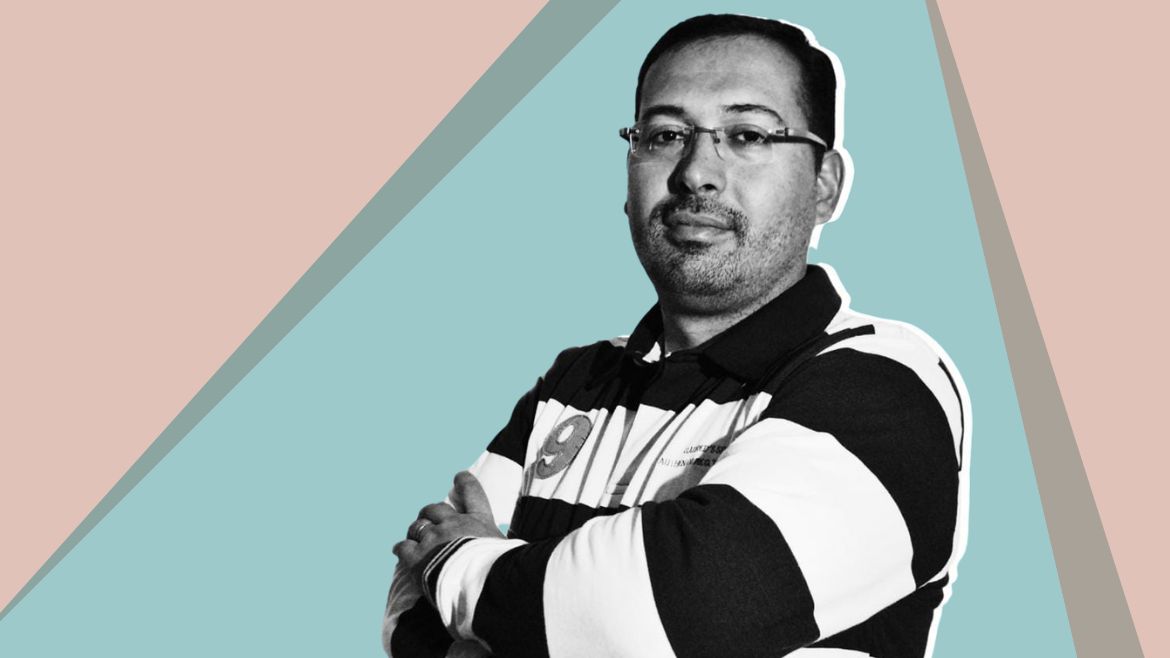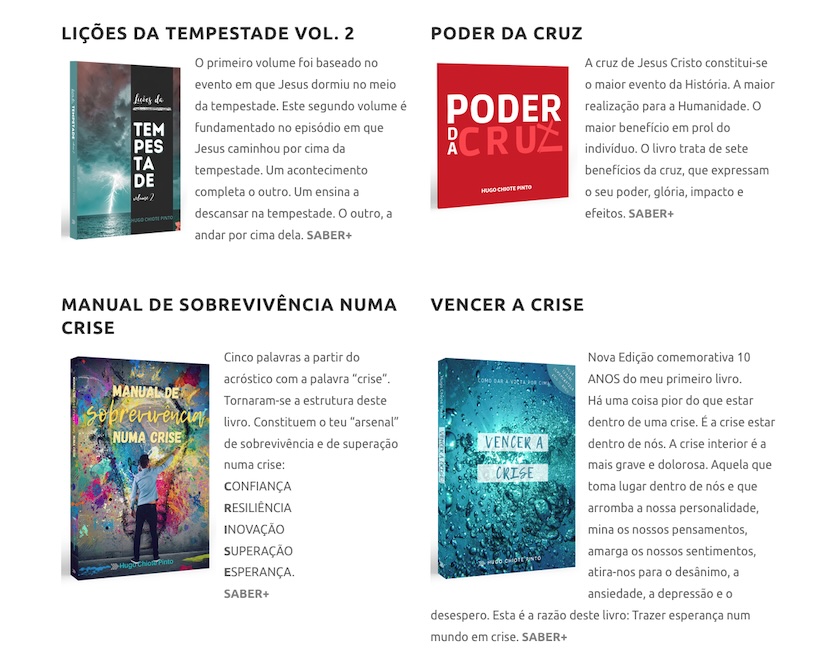Hugo Pinto, writer and preacher in Portugal, reflects on the practicality of faith in all areas, including finance. “Money is like a knife in the kitchen”.
 Hugo Chiote Pinto, Portuguese pastor and writer.
Hugo Chiote Pinto, Portuguese pastor and writer.
There are more than 3,000 quotes in the Bible about money and finances, yet it is still a subject that still makes many uncomfortable. That is not the case for Hugo Chiote Pinto.
This pastor, writer and lecturer based in Portugal discovered that what God has to say about money is not anecdotal, but essential for anyone who wants to develop a purposeful life.
For years, Hugo Pinto has been trained to teach leadership and effective management and has also written several books that deal with very practical aspects involving not only spiritual life or a collection of values, but also what he considers wisdom to apply to every situation and circumstance in life.
Hugo Pinto is a regular contributor to ASPEC, an organisation in Portugal that brings together Christian business people. Pinto was one of the guest speakers at the Iberian meeting held in Vigo last May. After this contact, we spoke with him again to delve a little deeper into the importance of the mind, decisions and emotions in what has to do with personal and professional management.
Question. As a pastor, why did you become interested in the business world and leadership?
Answer. As a pastor and a preacher, I am always looking for what God wants to say to his people. So, I became interested in aspects of leadership, first of all to improve the way I do ministry. I was being trained with materials from John Maxwell, one of the most renowned Christian mentors. And it was then that God led me to understand that it is not only what we consider spiritual that matters, but also the emotional and the physical, the practical things of life.
Once I understood this, I found that the Bible is not only about doctrine or aspects that we sometimes define as ‘spiritual’, but it is also very practical. And I realised that I had to preach in this way, with an emphasis on the practical. Because if God has communicated with us, it’s because he wants our lives to be different. It was a whole process, in which I began to read the Bible with different eyes, finding that it speaks to parents about how to educate, or to workers about how to develop in their work, or to businessmen about management principles.
That’s how I found that God wants to help people in the challenges of their daily lives. That involves personal development, care and service to people, through healthy leadership.
[destacate] “There are preachers who are proposing a negotiation with God. That is wrong”[/destacate]
Q. You often emphasise the importance of thinking well.
A. It is fundamental to consider our thinking and our emotions. What we think about ourselves influences how we feel, and that influences how we act. This is a pattern that has a direct influence in the financial area.
There are preachers who are proposing a negotiation with God. That is wrong. You can’t teach something like “give more so that God will bless you more”. That is wanting to use God, and it hurts people. Instead, He tells us to be wise, and He gives us tools to develop our wisdom in every area, and that includes the area of finances.
It saddens me to see that many people do not find principles in their churches that they can apply to their daily lives. As a pastor, I believe it is my responsibility to train people to be mature, effective in their jobs, in their families. I want the nourishment they receive from the Word in the church to nourish them and be useful to them.
Q. Has the Christian life become too spiritualised?
A. Many people think we only have to take care of the spiritual area, but the Bible teaches us that we are spirit, soul and body. Many would like God to solve problems for us, when what God does is to enable us to solve them. That is why we need wisdom. If we are able to change our thinking, then we will be better equipped to live, especially in the midst of difficulties.
When faced with a crisis, we often pray for God to take us out of the storm, to take us out of the tempest. But that is not the plan God shows us in the Bible. What God does is equip us to navigate and even walk through the storm. And it all starts with a change of mindset, a realisation that we can equip and prepare ourselves to face the crisis.
Great entrepreneurs are those who are able to grow even more when the crisis comes. It’s like a surfer who, when a bigger wave comes, has the ability to surf it the bigger it is.

[photo_footer]Some of Hugo Pinto's books / Hugo Pinto Writer[/photo_footer].
Q. What examples do you see in the Bible which show us the importance of wisdom?
A. There are many. We see it in the first church, in Acts, which is raised up with people who meet three conditions. They were people with proven character, people with the Holy Spirit and faith, and lastly, with wisdom. Solomon, before he was the richest and most prosperous king, was the king with the greatest wisdom. It is key that we develop this pattern.
[destacate]“For me, success is the multiplication of failures. When you fail, you learn”[/destacate] Q. How is wisdom different from knowledge?
A. The principle of wisdom is not only knowing something, learning or obtaining information, or is it that when a person leaves university, he or she is guaranteed a successful life? Not at all! Knowledge is an important thing, but wisdom goes beyond that.
Look at how the dictionary defines success: “absence of failure”. For me, success is the multiplication of failures. I have learned that failure is a school, because if when you fail, you learn, you are thriving. The wisdom is to realise that failure can be a step towards success. It is impossible to achieve success without following a path of failure. But if, when I fail, I remain sad, do not reflect and do not learn, it will be a double failure. But if I learn, reflect and understand that failure is part of my path to success, then I am able to change my course. Wisdom is the key to rebuilding and learning from failure.
Q. In the church there are different profiles: entrepreneurs, workers, students, unemployed... Do you think these principles are applicable to everyone?
A. Yes, the wisdom is to apply them in each context. Lately I see many ‘coaches’, many people, especially through social media, offering people their ‘secrets’ to become millionaires. And they say that everyone can be a businessman or entrepreneur. But I don't agree with that.
Each person has to discover what he or she is capable of doing, and find his or her place, where he or she can develop according to God’s plan. Failure sometimes shows me what I need to improve, but it can also indicate the need for a change of direction.
So be sensitive and be careful: we are not all the same, we do not all have the same talents or the same possibilities, but we are all loved by God. He has created us with a purpose, and it is important that we follow it. Has God called you to be an entrepreneur, to develop in the business world, and to make money? If so, go for it! But others will be called to be good workers where they are, as employees, and if that is God’s purpose, go ahead too!
[destacate] “Some people are afraid of money, but that is the same as being afraid of a knife in the kitchen”[/destacate] Q. What about the money?
A. Money is a blessing, a tool God provides us with to do His work. Some people are afraid of money, but that is the same as being afraid of a knife in the kitchen. Don’t we use that knife to help us prepare food? But if it is misused, it is a dangerous object. It is the same with money. Money gives us opportunities, it opens doors, it gives us freedom.
I want Christian entrepreneurs to prosper, to make money, to do better business, because that is their purpose and that opens up more opportunities to extend the kingdom of God.
But the danger is in allowing ourselves to be dominated by money, and the Bible warns us not to be greedy, to understand the purpose of money.
Even when we are in a situation of little money, we can learn to be happy, as Paul said: in any situation. For that it is important to remember that our identity should not be based on what we earn, or the social position we occupy. Our identity should be based on the love of God. Knowing that we are loved by God, understanding his purpose for our lives, is how we lay the foundation for living in wisdom.
This article was produced for the Líderes Empresariales section of Protestante Digital, an initiative of the Gospel, Economy and Business (Tres-E) group in Spain.
[analysis]
[title]One more year[/title]
[photo][/photo]
[text]At Evangelical Focus, we have a sustainability challenge ahead. We invite you to join those across Europe and beyond who are committed with our mission. Together, we will ensure the continuity of Evangelical Focus and Protestante Digital (Spanish) in 2025.
Learn all about our #OneMoreYearEF campaign here (English).
[/text][/analysis]

Las opiniones vertidas por nuestros colaboradores se realizan a nivel personal, pudiendo coincidir o no con la postura de la dirección de Protestante Digital.
Si quieres comentar o